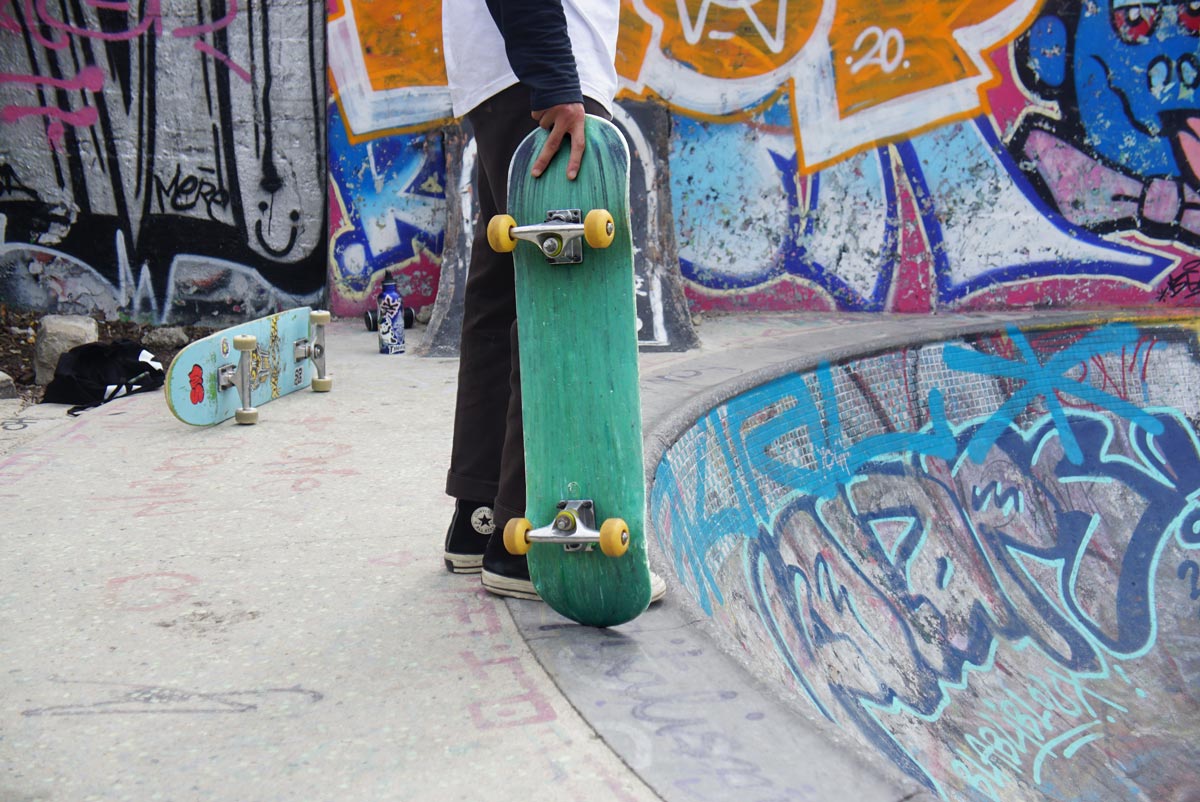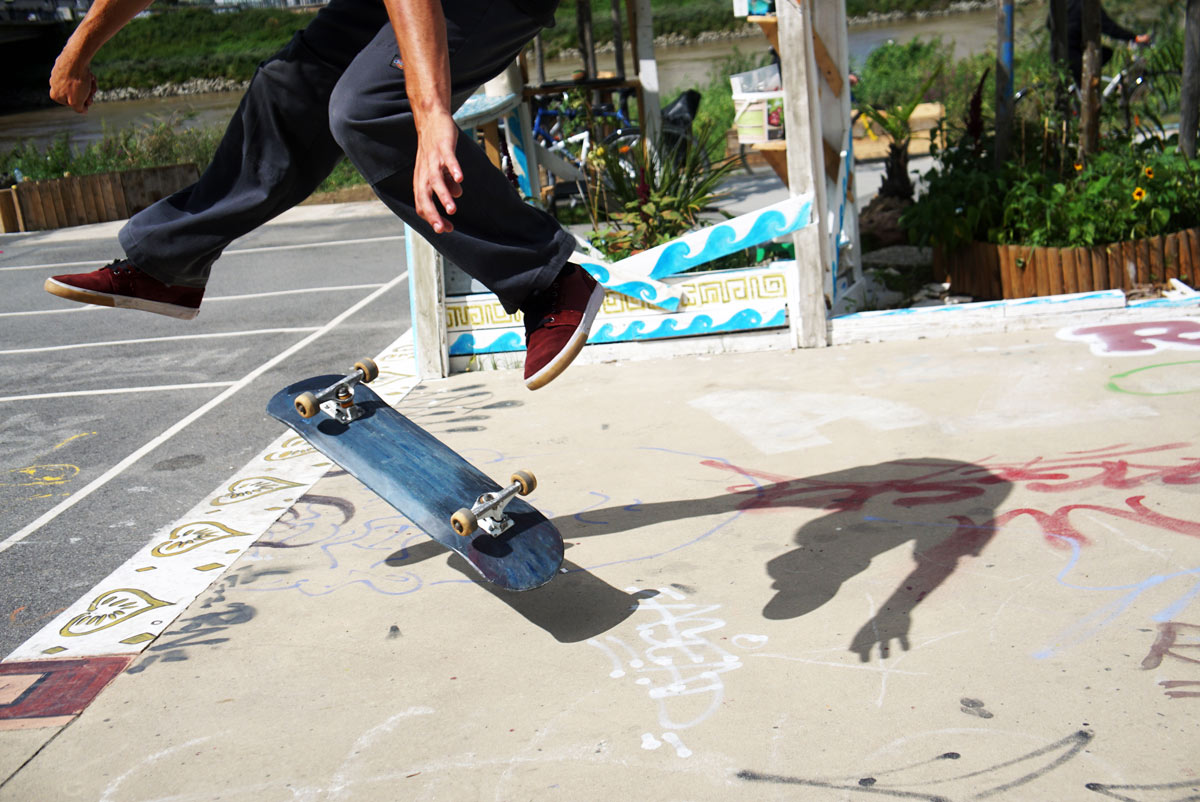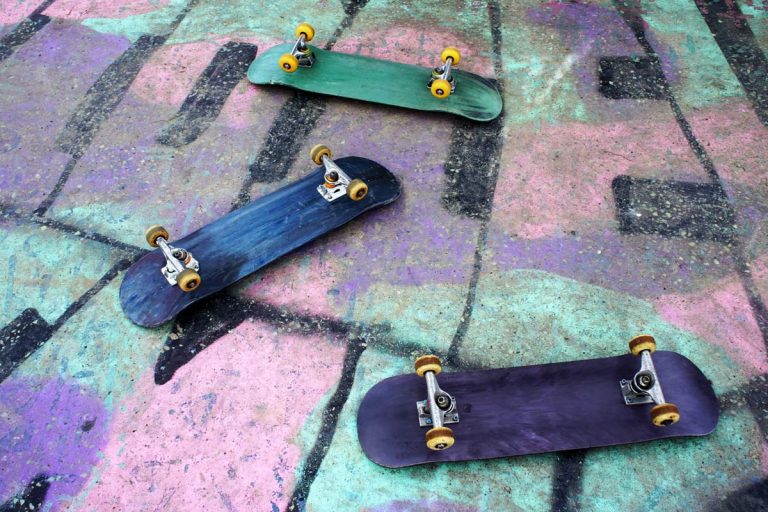Jason Knight’s skateboards aim to ramp up recycling
Skateboarding is a rough sport, full of skinned knees and shattered boards. That’s why industrial product designer Jason Knight thought to start making decks out of recycled plastic: “I wanted to create a product that shows people the deck’s physical properties, its strength and durability, more than just its beautiful appearance,” he says.
His live Kickstarter campaign is inviting backers to get early access to the boards—or in-depth open-source tutorials to produce them independently.
The challenges of working with recycled materials
Knight has always been a maker, and in university, he turned his interest toward recycled and sustainable materials in particular. It wasn’t always pleasant for his flatmates, though. His early process was rudimentary at best.
“I made the whole house smell super bad: I took plastic shopping bags and two pieces of wood and melted them by hand in the oven, then packed it into a ball, pressed it between two pieces of wood, and carved that little brick by hand.”
It was enough to show him the potential of the material. But to do it safely and at scale, he learned that he’d be much better off using machines that can shred, sheet press, extrude, and mould recycled plastic. They’re expensive—Knight estimates that you’d need £10,000 to get started with a full industrial rig—so he started looking into how he might be able to develop more accessible and affordable alternatives.
The Precious Plastic community fuels small businesses that focus on recycling

Knight’s research on the topic quickly brought him in touch with a group that was successfully doing the work already: Precious Plastic.
Since 2012, this open-source network of creative recyclers has been developing educational resources and machines to help more people like Knight affordably create recycled products. Instead of tens of thousands of dollars, these machines cost as little as $50, or at most a couple of thousand dollars. “They’re designed to be made with a relatively low set of skills and low machine requirements,” Knight explains, “so anyone with a hand drill and an angle grinder and a really basic welding machine can put them together and set up little plastic recycling ecosystems.”
“This is something like how a traditional woodworker has a saw and a drill in his garage or in his workshop,” Knight says. “We’re creating the machines to allow plastic recyclers to do the same.”
Around the time Knight joined the Precious Plastic community, the project won a €300,000 research grant and free space from the city of Eindhoven, in the Netherlands. Precious Plastic founder Dave Hakkens used these resources to set up a residency to host over 120 voluntary researchers with free room and board.
This year, the physical program has downsized but become more distributed and networked. “Everyone has branched off into doing their own things and setting up their own workspaces,” Knight explains. “People started workshops in the back of vans, to travel to different events for demonstrations, and people have bought or rented their own workshops and they’re starting their own product design facilities and doing their own research.”
The organisation’s global online community is now 80,000 strong. Forum and tutorial pages facilitate networked learning, and a map of participants helps members connect and support each other out in the world. “So it’s like this unification of plastic recyclers with a platform underneath, which allows us to work together and communicate efficiently,” Knight says.
Taking the idea to the ramps and rails
The time Knight has spent working with Precious Plastic has helped him see what types of products best highlight the material’s potential—and gave him the idea to make recycled plastic skateboard decks.
“When people see products made from recycled plastic, they think, ‘Oh, it looks really beautiful, the surface texture is really nice and aesthetically it’s really beautiful,’” Knight says. “What I think is often overlooked is the strength of the material: it’s actually really strong, tough and durable. So I wanted to create a product that basically when people see it being used, they immediately understand and think, ‘Wow, that’s really strong.’”
The recycled-plastic skateboard decks Knight has developed and is now offering in his Kickstarter campaign are more springy, with more pop than traditional boards, allowing higher jumps, better carving speed, and more flexibility to follow the curve of bowls. The surface texture is also slippy, so grinding tricks don’t require any board wax.
In testing them with skaters, he’s seen a range of reactions. “Some people are more set in their ways, some are super positive and excited about the possibility of doing new things—it feels different from a normal board and that sparks interest and curiosity,” he says.

Open source solutions make recycling a movement
Knight wants to create a new kind of board deck, yes, but more importantly, he wants to strengthen the recycling ecosystem and give people who would never normally have the opportunity to get a deck the chance to do so. That’s why he’s sharing open-source in-depth manufacturing instructions as part of his Kickstarter campaign.
These will include a video, a step-by-step picture guide, an electronics diagram, and a list of the components—“basically all of the information people need to replicate the system,” Knight says.
All of the research work that Knight and Precious Plastic do is published online for free, so anyone can replicate it. “This is to make it easy for people to implement the stuff that we design—we don’t want to just keep it and sell it ourselves to make a lot of profit. We want as many people as possible to be able to start replicating it, selling it themselves to local people, just so the project grows quicker and we can recycle plastic quicker,” he says. “It also creates a feedback loop of information and people share back innovations they discover,” again, speeding the development process.
“The clock is ticking for the ecosystem, we can’t just do it slowly, we have to be quite proactive and push this forward if we’re actually going to reverse the damage that’s happening.”





